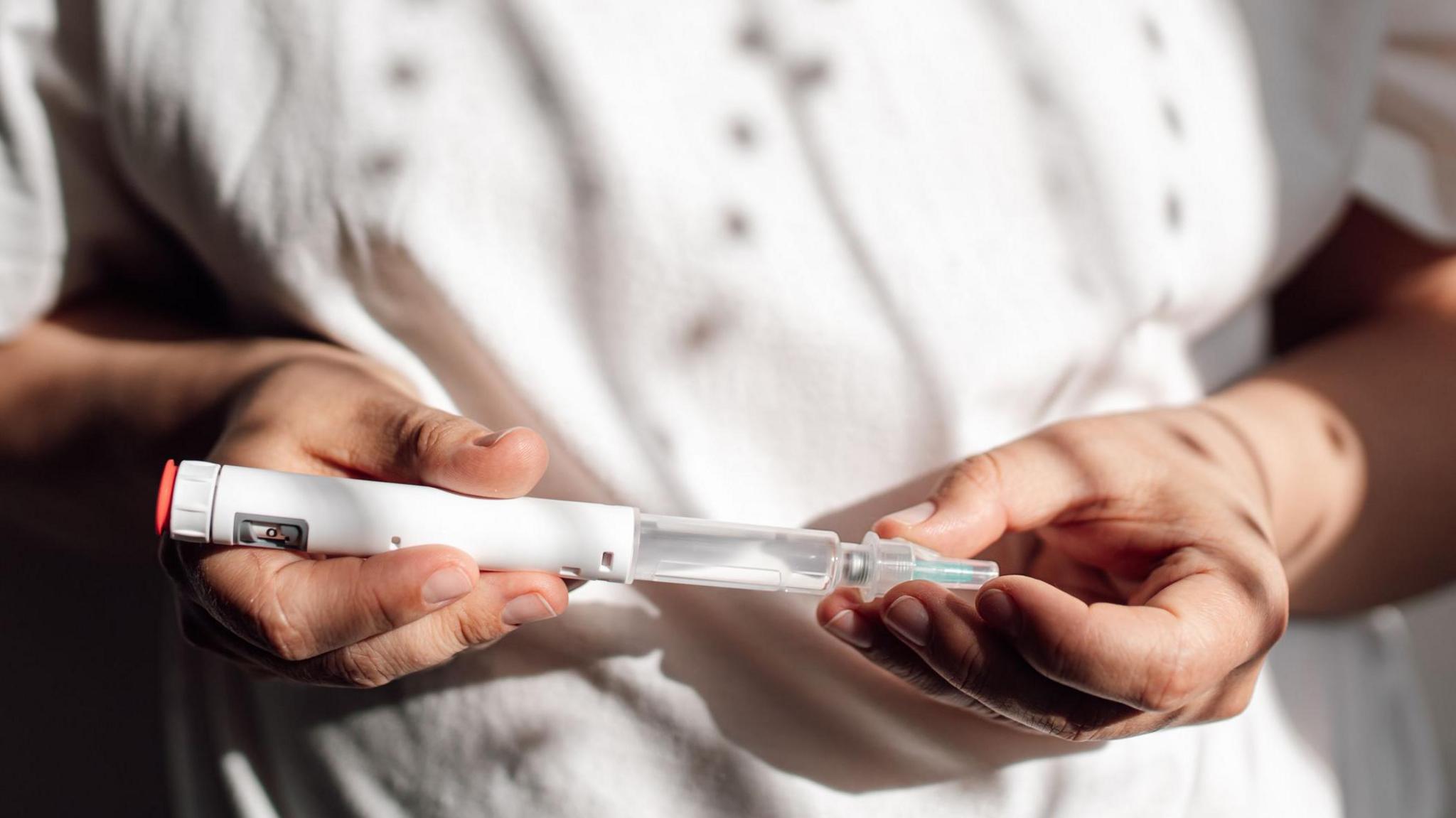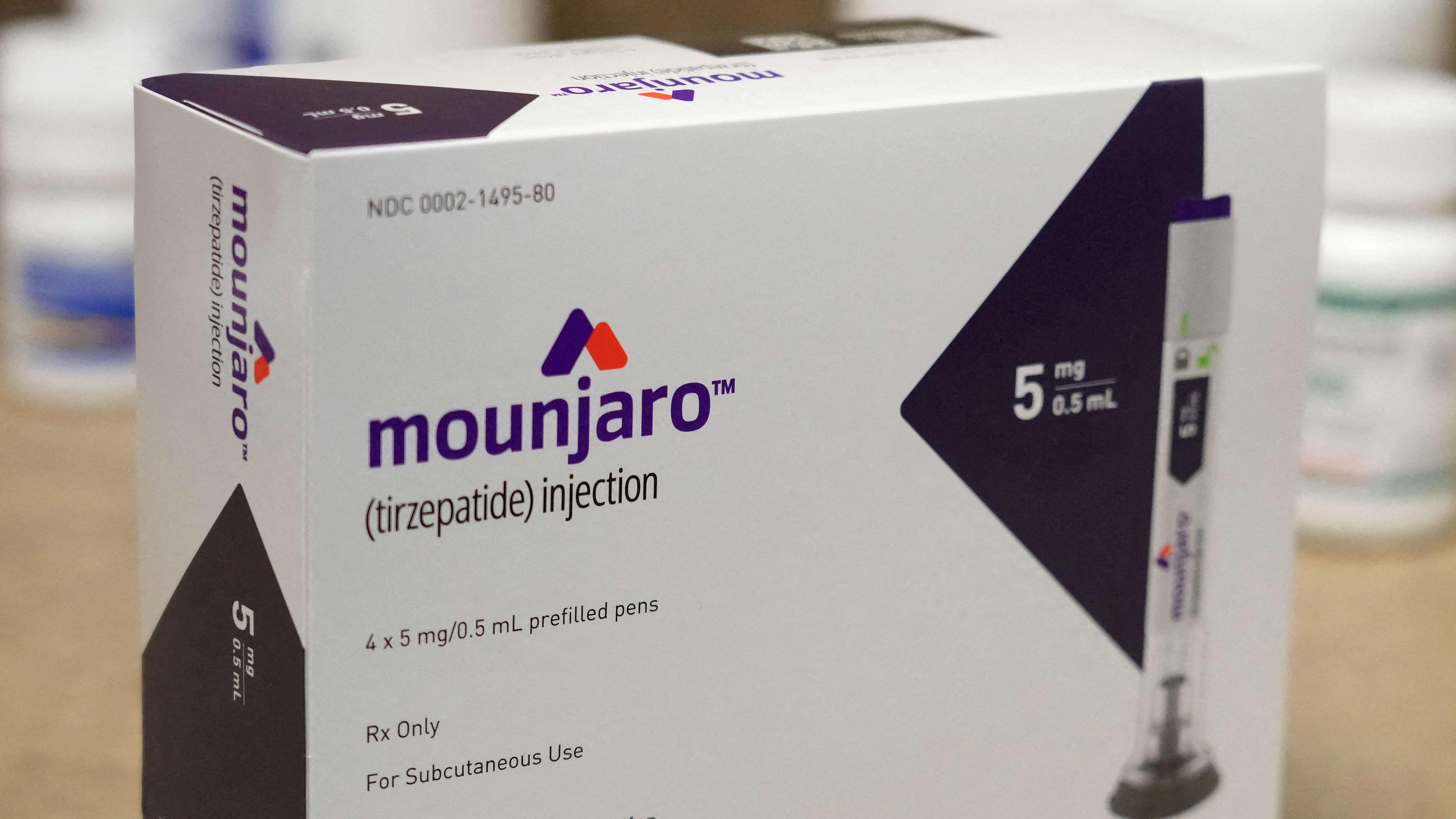How do weight-loss drugs like Mounjaro and Wegovy work?

- Published
There are currently thought to be about 1.5 million people on weight-loss drugs in the UK.
Some people are able to get the injections - called Mounjaro and Wegovy - through the NHS but most buy them privately.
Those buying Mounjaro are expected to see prices rise from September.
How do Wegovy and Mounjaro work?
There are two drugs on the market - semaglutide, marketed under the brand name Wegovy, and tirzepatide, sold as Mounjaro.
They are given as weekly injections via pre-filled pens that can be self-administered into the upper arm, thigh or stomach.
Both drugs work as an appetite suppressant by mimicking a hormone which makes people feel fuller. Mounjaro also affects metabolism and helps regulate energy balance.
Patients generally start on a low level dose which is gradually increased until they reach a maintenance dose.
How much weight do people lose?
People typically start to lose weight within a few weeks.
The first head-to-head trial of the two drugs suggested that Mounjaro was more effective.
Mounjaro's 20% weight reduction, after 72 weeks of treatment, exceeded the 14% for Wegovy.
The trial - funded by Mounjaro manufacturer Eli Lilly - involved 750 obese people, with an average weight of 113kg (nearly 18 stone).
However, research suggests people put most of the weight back on within a year of stopping the drugs, as their normal food cravings return.
The NHS has been urged to provide regular check-ups, support and advice, to prevent this happening.
Who can get weight-loss drugs on the NHS?
Wegovy is currently available on the NHS in England, Wales and Scotland.
To qualify, adults must be obese (with a BMI of at least 35) and have at least one pre-existing weight-related health condition such as high blood pressure.
People with cardiovascular disease who are classed as overweight, but not quite obese, can also be given the drug.
Patients should follow a diet and physical activity programme, and the drug should be only prescribed for a maximum of two years, according to NHS guidelines.

Mounjaro has been available from specialist NHS weight-loss clinics in England and Wales since March 2025.
In June, some GPs in England started offering it to NHS patients who meet strict criteria:
a BMI of 40 or over (or 37.5 if from a minority ethnic background)
and four out of five of these conditions: type 2 diabetes, high blood pressure, heart and vascular disease, high cholesterol and obstructive sleep apnoea
Patients who are prescribed Mounjaro will also get regular check-ups, exercise support and advice on healthy eating.
It is thought around 3.4 million people could eventually qualify for Mounjaro.
However, the body which assesses how the NHS uses drugs, the National Institute for Health and Care Excellence (NICE), has warned that it could take more than a decade to roll out access to everyone who could benefit.
What do Wegovy and Mounjaro cost to buy privately?
Wegovy and Mounjaro can both be bought privately, in supermarkets, chemists and high-street clinics. Estimates suggest nine in 10 pay for the drugs privately.
Pens typically cost between £100 and £300, depending on the dose.
However, the price of Mounjaro is expected to rise sharply in the UK. In August, Eli Lilly announced it was putting up the list price by as much as 170%.
This could have meant the cost of the highest dose going up from £122 to £330 per month. However, the BBC understands the highest dose will now be sold to suppliers for £247.50.
The drugs should not be bought from unregulated sources.
Since February online pharmacies have been required to employ stricter checks to stop people who are already a healthy weight or have a history of eating disorders buying weight-loss jabs.
The BMI of patients who have completed online questionnaires or sent photos must also be verified.

What are the side-effects of weight-loss injections?
The most common side-effects are feeling sick, vomiting, bloating, constipation and diarrhoea. Some people report hair loss.
For many, the side-effects are manageable and tend to go away in time; others say they stopped taking the drugs because of them.
Experts warn the complications can be worse if the drugs are abused, for example, taken as a quick fix to lose a few pounds.
In rare cases, serious side-effects can include gallbladder and kidney problems and depression.
There have also been hundreds of reports of people suffering problems with their pancreas - although none are confirmed as being caused by the medicines.

Obesity specialists say the drugs should be used alongside a programme of exercise and health eating
What are the warnings about pregnancy?
The UK's medicines regulator, the MHRA, has warned women that the lack of information about how the drugs could affect unborn children means they must not be taken:
during pregnancy
while trying to get pregnant
during breastfeeding
The drugs can also stop the contraceptive pill being absorbed properly.
The MHRA recommends that women taking the jabs consider using additional or alternative contraception.
What is obesity and what is a healthy BMI?
The term obese describes a person with excess body fat.
In the UK it's estimated that around one in every four adults is obese.
The standard way of categorising people's weight is by calculating their body mass index, or BMI.
For most adults, if your BMI is:
below 18.5 – you're in the underweight range
18.5 to 24.9 – you're in the healthy weight range
25 to 29.9 – you're in the overweight range
30 to 39.9 – you're in the obese range
40 or above – you're in the severely obese range
Those with an Asian, Chinese, Middle Eastern, Black African or African-Caribbean family background need to use a lower BMI score:
23 to 27.4 – overweight
27.5 or above – obese
BMI has some limitations because it measures weight, not fat. Someone who is very muscular can also have a high BMI.
But for most people, it is a useful indication of whether they are a healthy weight.